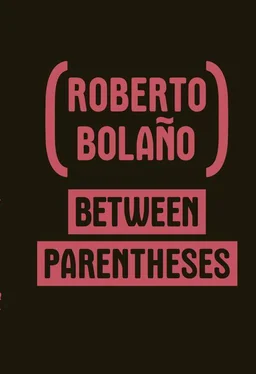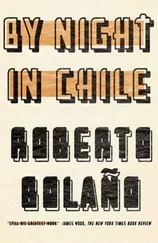Roberto Bolaño - Between Parentheses - Essays, Articles and Speeches, 1998-2003
Здесь есть возможность читать онлайн «Roberto Bolaño - Between Parentheses - Essays, Articles and Speeches, 1998-2003» весь текст электронной книги совершенно бесплатно (целиком полную версию без сокращений). В некоторых случаях можно слушать аудио, скачать через торрент в формате fb2 и присутствует краткое содержание. Год выпуска: 2011, Издательство: New Directions, Жанр: Публицистика, Критика, на английском языке. Описание произведения, (предисловие) а так же отзывы посетителей доступны на портале библиотеки ЛибКат.
- Название:Between Parentheses: Essays, Articles and Speeches, 1998-2003
- Автор:
- Издательство:New Directions
- Жанр:
- Год:2011
- ISBN:нет данных
- Рейтинг книги:4 / 5. Голосов: 1
-
Избранное:Добавить в избранное
- Отзывы:
-
Ваша оценка:
- 80
- 1
- 2
- 3
- 4
- 5
Between Parentheses: Essays, Articles and Speeches, 1998-2003: краткое содержание, описание и аннотация
Предлагаем к чтению аннотацию, описание, краткое содержание или предисловие (зависит от того, что написал сам автор книги «Between Parentheses: Essays, Articles and Speeches, 1998-2003»). Если вы не нашли необходимую информацию о книге — напишите в комментариях, мы постараемся отыскать её.
The Savage Detectives
Between Parenthese
Between Parentheses: Essays, Articles and Speeches, 1998-2003 — читать онлайн бесплатно полную книгу (весь текст) целиком
Ниже представлен текст книги, разбитый по страницам. Система сохранения места последней прочитанной страницы, позволяет с удобством читать онлайн бесплатно книгу «Between Parentheses: Essays, Articles and Speeches, 1998-2003», без необходимости каждый раз заново искать на чём Вы остановились. Поставьте закладку, и сможете в любой момент перейти на страницу, на которой закончили чтение.
Интервал:
Закладка:
The rhapsode remembers everyone. No one pays him. His art is free. At some point Don Josep Ponsdomènech told me the story of his life: full of pleasures of every sort, he stresses, as well as misfortunes, intrinsic to existence, he sighs, and from all of it he’s emerged unscathed and cooler than a cucumber. His favorite authors are definitely the modernists, Rubén Darío first among them, but I’ve also heard him express his admiration for Salvat-Papasseit, that brave young man, and so modern. Don Josep Ponsdomènech is brave too, of course, and, in his own way he was once modern, but his principal virtue, among the many with which he’s graced, is the most human of all: happiness.
It’s nice to live in Blanes and to know that on sunny days our rhapsode, well bundled up, is strolling the Paseo Marítimo and the heart of the town.
A SOUL SOLD TO THE DEVIL
Norberto Fuentes, the author of Condenados de Condado [The Condemned of Condado], in a number of ways a memorable book, has sold his soul to the devil. Norberto Fuentes is Cuban. He lives in the United States now, but not so long ago he lived in Havana, where one can imagine he walked the streets with a lordly air. His most recent book, Dulces guerreros cubanos [Sweet Cuban Warriors], is just out from Seix Barral, and in it he appears to tell the story of his friendship with General Ochoa and the De la Guardia brothers, that is, the men who were shot or locked up by the Cuban regime in 1989. Ochoa and the De la Guardias were men of the Cuban revolution, and Norberto Fuentes, in syncopated style, describes some of their adventures, as well as the adventures of many other characters with roles in the regime’s military and political apparatus: from Fidel Castro to the countless bureaucrats who taped conversations.
Norberto Fuentes — and this is one of the oddities of the book — doesn’t hide that he was a favored son of the revolution. He struts the streets of Havana wearing a Rolex, and tells us about the curious penchant of the top commanders for owning duplicates of everything: two Rolexes, two houses, two wives. He also discusses the prisons and wars of the regime, a regime that he defended with bellicose ardor until things turned ugly. It’s as if Raúl Castro were to go into exile in Miami today and write a book lamenting the injustices committed by his brother during forty years of dictatorship. But Norberto Fuentes was once a writer of some talent, and his talent persists, barely a shadow of what it was or could have been, but it’s still there. And it can be felt. He doesn’t ask for forgiveness. He tries to justify himself. He adopts a cynical and nihilistic stance, but he doesn’t ask for forgiveness. The Cuban revolution appears in his book as what it is: a gangster movie shot in the tropics. And in that movie Norberto Fuentes thinks he played an important role, when really he was just one of the big man’s jesters, nothing more. In his American exile, Cuba’s official Hemingway expert tries to write like Hemingway, but he doesn’t manage it. The book is about indignity and shame and Fuentes’s writing oozes indignity and shame. Parties and power are a distant memory. The drives around Havana in his tricked-out Lada are a distant memory.
Norberto Fuentes is no longer a writer, he’s a lost soul.
THE ANCESTOR
We all have some idiot ancestor. All of us, at some point in our lives, discover the trace, the flickering vestige of our dimmest ancestor, and upon gazing at the elusive visage we realize, with astonishment, incredulity, horror, that we’re staring at our own face winking and grinning at us from the bottom of a pit. This exercise tends to be depressing and wounding to our self-esteem, but it can also be extremely salutary. My idiot ancestor was called Bolano (Bolanus) and he appears in the first book of Horace’s Satires , IX, in which Bolano accosts the poet as he walks along the Via Sacra. Says Horace: “Suddenly a fellow whom I knew only by name dashed up and seized me by the hand. ‘My dear chap,’ he said ‘how are things?’ ‘Quite nicely at the moment thanks,’ I said. ‘Well, all the best!’ He remained in pursuit, so I nipped in quickly: ‘Was there something else?’ ‘Yes,’ he said. ‘You should get to know me. I’m an intellectual.’ ‘Good for you!’ I said.” What follows is a tiresome stroll for Horace, since he can’t shake Bolano, who ceaselessly offers advice, praising his own work and even his talent for singing. When Horace asks if he has a mother or family to care for him, Bolano answers that he’s buried them all and he’s alone in the world. Lucky for them, thinks Horace. And he says: “That leaves me. So finish me off! A sinister doom is approaching which an old Sabine fortune-teller foresaw when I was a boy.” The walk, nevertheless, continues. Bolano then confesses that’s he’s out on bail and must appear in court, and he asks Horace to lend him a hand. Horace, of course, refuses. Then a third person appears and Horace tries in vain to slip away. It must be added, in Bolano’s defense, that this new character, Aristius Fuscus, a dandy of the era, is just as much an idiot as Bolano and actually is Horace’s friend. In the end, it’s Aristius Fuscus who accompanies Bolano to his appointment with the law.
There’s no moral to this story. We all have an idiot ancestor. He’s a specter, but he’s also our brother, and he lives deep inside each of us under different names that express our degree of implication in the crime: fear, ridicule, indifference, blindness, cruelty.
THE NOVEL AS PUZZLE
For Antoine Bello, French author born in Boston in 1970, every novel is, among other things, a puzzle. I’ve just read his first novel, The Missing Piece (Anagrama), which really is a puzzle: that is, it’s a crime novel complete with a serial killer, professional puzzle players, even puzzle championships, and it’s structured like a puzzle whose pieces the reader must put together to find the killer — for one thing — but also and above all for the sake of pleasure, since pleasure, pure and simple, is the ultimate goal of any novel. By this, of course, I mean pleasure or enjoyment that isn’t at odds with horror or with the greatest rigor or with the writer’s responsibility to his story (which, incidentally, is often his own story).
In the tradition of Georges Perec, Bello’s outstanding novel is conceived as a machine, structured in three parts. The first part is called “The Enigma,” and in it summaries are given not just of the murders but of some of the most important aspects of the world of puzzles and its most competitive and public manifestation, the professional puzzle championship circuit. The third part is called “The Solution.” In it, obviously, we’re told the name of the killer and the reason for his abominable deeds. In between is the second part, consisting of 48 chapters, each of which represents a piece of a 48-part puzzle, with the added detail that the 48th piece, in other words the last, is blank. It’s on this “missing piece” that the novel turns, and as we follow its trail we’re told the curious tale of the Bantamolians, the Central African tribe whose existence is closely bound to the puzzle, functioning as construction and also as deconstruction, or as a device that parses and dictates fate; and also the tale of a craftsman who makes crime-scene puzzles, many of which are missing a piece, an absence that contains presences or that is the key to interpreting and deciphering an enigma.
Then, too, Antoine Bello’s novel is narrated from different points of view and through the lens of various genres, among them the epistolary novel, the detective novel, the satire, the adventure novel, the ethnographic novel, the populist novel, the symbolist novel, and the naturalist novel, not to exclude chapters in which the storytelling is based on mathematics, logic, or religion. In sum, we have before us a great novel, and above all a great novelist, scarcely thirty years old, whose future work undoubtedly has great surprises in store for us.
Читать дальшеИнтервал:
Закладка:
Похожие книги на «Between Parentheses: Essays, Articles and Speeches, 1998-2003»
Представляем Вашему вниманию похожие книги на «Between Parentheses: Essays, Articles and Speeches, 1998-2003» списком для выбора. Мы отобрали схожую по названию и смыслу литературу в надежде предоставить читателям больше вариантов отыскать новые, интересные, ещё непрочитанные произведения.
Обсуждение, отзывы о книге «Between Parentheses: Essays, Articles and Speeches, 1998-2003» и просто собственные мнения читателей. Оставьте ваши комментарии, напишите, что Вы думаете о произведении, его смысле или главных героях. Укажите что конкретно понравилось, а что нет, и почему Вы так считаете.












